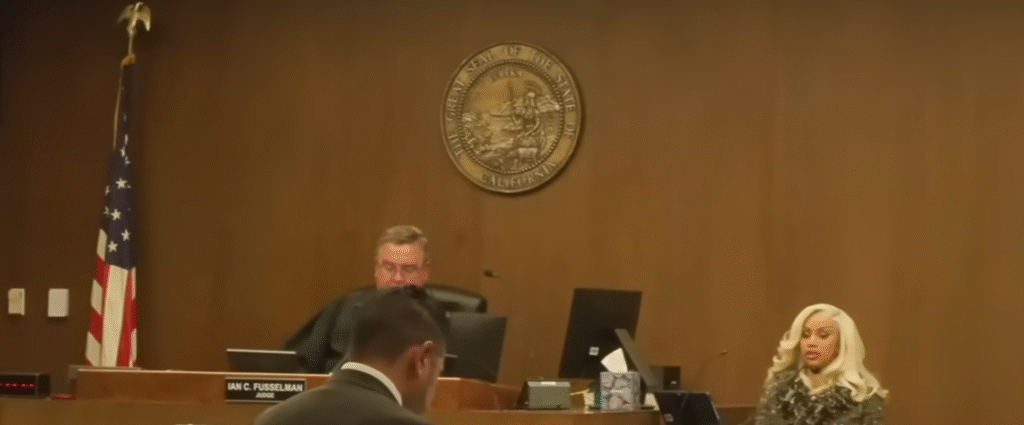Audiences are as enthralled with Cardi B’s ongoing trial as they were with her music. She has been in front of a jury in recent days on charges of assaulting a security guard in a doctor’s office in Beverly Hills in 2018. Emani Ellis, the plaintiff, alleges Cardi spat at her, hurled insults, scratched her cheek with long acrylic nails, and left her with an emotional and visible scar. However, the rapper maintains that only heated words were spoken.
The altercation took place at a vulnerable point in Cardi’s life. She was trying to hide her condition from her obstetrician while she was four months pregnant. According to her testimony, Ellis refused to “back up,” followed her down a hallway, and seemed to record her on a phone. Although there was no physical altercation, she believed it was a violation of privacy that led to a verbal argument. She told the court in a very clear voice, “I didn’t touch her.” “It wasn’t physical at all, but it was more like a verbal altercation.”
Ellis, however, has been pursuing the case since 2020, calling the encounter traumatic and asserting that Cardi B not only hurt her but also attempted to use her fame to threaten her employment. Ellis dropped the employment-related accusation, but she is still suing for $24 million. The figure itself demonstrates how celebrity disputes frequently escalate into multimillion-dollar lawsuits, blurring the distinction between justice and opportunism.
Cardi B – Key Facts
| Name | Belcalis Marlenis Almánzar |
|---|---|
| Stage Name | Cardi B |
| Profession | Rapper, songwriter, actress, entrepreneur |
| Born | October 11, 1992 (Age 32) |
| Birthplace | The Bronx, New York City, U.S. |
| Career Breakthrough | Viral social media personality, VH1’s Love & Hip Hop: New York |
| Music Success | “Bodak Yellow,” “I Like It,” Grammy-winning debut album Invasion of Privacy |
| Current Lawsuit | Sued by security guard Emani Ellis for assault, battery, negligence, false imprisonment, and intentional infliction of emotional distress |
| Claim Amount | $24 million in damages |
| Trial Location | Alhambra, California |
| Reference | BBC – Cardi B Court Testimony |

In recent days, Cardi’s defense has significantly improved. Ellis was the aggressor, cutting the receptionist’s forehead while reaching for Cardi, according to a witness who worked as a receptionist during the incident. Additionally, the obstetrician remembered that Ellis had no facial injuries at the time. These statements were incredibly successful in supporting Cardi’s account of what happened and refocusing attention on the potential that Ellis overstated her statements.
The trial bears a striking resemblance to previous celebrity court battles in which notoriety elevates routine disagreements into epic legal dramas. For example, the lawsuits filed by Johnny Depp and Amber Heard made it difficult to distinguish between perception and reality. That trend is evident in Cardi’s case, where every hairstyle, every chuckle, and every incisive remark are examined on Twitter, Instagram, and TikTok in addition to in court.
The way that this case highlights the relationship between vulnerability, privacy, and fame is especially novel. Cardi described how, when confronted, she feared for her unborn child. Pregnancy heightens the need for security for many women, and Cardi’s testimony speaks to more than just her fan base; it highlights the emotional toll that public figures face when their personal lives are violated.
At the same time, rather than elucidating the evidence, Ellis’s attorney added details that ran the risk of escalating prejudice. In court, Cardi’s legal team argued that the questions regarding her wigs, her history as a stripper, and references to her alleged gang affiliations were unjustly damaging and irrelevant. These strategies highlight the fact that women in entertainment frequently endure character trials on par with those in the legal system, being compelled to reenact historical events that are unrelated to the current case.
Cardi’s additional legal issues, meanwhile, complicate the narrative. A woman in Las Vegas is also suing Cardi for assault and negligence, claiming that after being splashed with water during a performance, Cardi threw a microphone at her. Ironically, the evidence became a collector’s item when that microphone sold for almost $100,000, but the plaintiff continues to claim that the distress was long-lasting. These overlapping lawsuits show how the actions of celebrities, even in moments of annoyance, can turn into protracted legal and financial disputes.
Fans are keeping a close eye on Cardi, with many of them supporting her and claiming that she is being unfairly singled out for being successful and vocal. Others interpret the case as a cautionary tale about accountability in the public eye, where fame and fortune do not absolve one of responsibility. The trial, when viewed in the context of larger celebrity culture, reveals a society that is both enthralled with and torn by stars—ready to hold them to account in highly visible ways while also wanting to elevate them.
For Cardi, the case is about narrative control as much as the financial stakes. Being unvarnished, unrepentant, and brutally honest has been the foundation of her career. By denying any physical assault and admitting to cursing at Ellis, she establishes credibility. Her strongest defense may be this noticeably enhanced sense of honesty, which demonstrates that acknowledging one’s shortcomings is not the same as acknowledging guilt.

